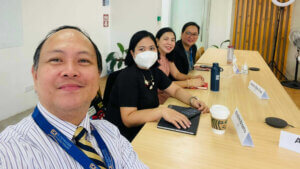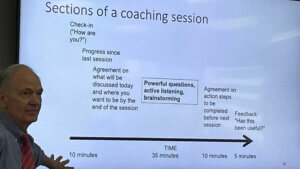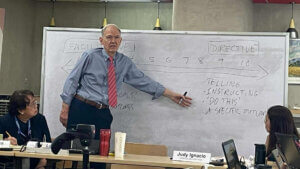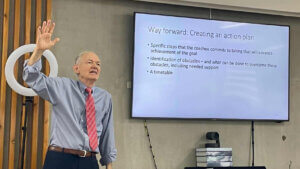On October 9, 2024, we participated in an insightful session on executive coaching titled “Coaching for Success: A Refresher Course,” led by Professor Tully Moss. Professor Moss is certified by the International Coach Federation and recognized by Zenger Folkman and The Leadership Circle for his expertise in 360-degree assessments. Below are the key takeaways and discussions from our training session with him.
What is Executive Coaching?
Executive coaching is a personalized, one-on-one relationship between a certified coach and an executive, a leader and their staff, or a resource person and a colleague, friend, or employee, aimed at addressing specific challenges. In essence, coaching helps leaders navigate the complexities of their roles, fostering self-awareness and strategic decision-making derived from the coaching experience.
Leaders who develop executive coaching skills can unlock their potential and drive organizational success by providing tailored feedback and guidance.
Guidelines for Coaching and Mentoring
- Center Yourself: Approach with a sincere desire to help. Start with empathy and respect, ensuring ethical behavior. Create a trusting environment where confidentiality is paramount.
- Ask Questions: Focus on inquiry rather than directives. Coaching is about asking the right questions to facilitate insight and growth.
- Provide Feedback: Offer immediate feedback, whether positive or constructive. Effective coaching can happen spontaneously, in the moment.
The Coaching Process
- Building Trust and Ethics: Establish trust. Make it clear that you may not have all the answers but can ask the right questions.
- Clarifying Goals: Collaborate with the coachee to define desired outcomes.
- Understanding Timing: Recognize the right conditions for various types of coaching.
- Adapting to Generational Differences: Be mindful of how you engage with different generations in the workplace.
- Learning from Experience: Share what has worked and what has not in past coaching scenarios.
- Acknowledging Cultural Context: In Philippine culture, there may be more reliance on directive approaches, as it is a paternal or maternal society. A purely facilitative method may not always yield engagement or motivation.
Steps in the Coaching Process
- Establish trust and ethics.
- Define goals and success criteria.
- Practice active listening.
- Ask powerful questions focused on realistic and actionable items.
- Develop an action plan and roadmap forward.
- Ensure accountability with disciplined commitments and performance metrics between sessions.
The GROW Model for Effective Coaching
- Goal: Identify the overall goal for coaching. Align on a primary coaching goal and session objectives, ensuring coachee involvement.
- Reality: Assess the current situation without dwelling on past issues. Help coachees focus forward and avoid repeating pitfalls.
- Options: Encourage coachees to generate their own options for improvement. Facilitate idea generation, offering suggestions only after the coachee has explored their ideas.
- Way Forward: Outline clear steps to achieve the goals. Plan actionable steps and monitor progress until the coaching process becomes automatic, providing feedback when necessary.
Essential Considerations for Coaches
Reflect on your personal fulfillment as a coach and how to navigate workplace dynamics. Maintain professionalism and focus on the coachee’s needs, steering discussions back to work-related topics. Your character will influence the coaching environment.
Be prepared for the complexities of human interactions: while personal matters should not dominate, they can impact professional relationships. As a coach, aim to speak less than 20% of the time, ensuring the coachee remains the focus of the conversation.
Recognize that coaching is not therapy or counseling. If challenges arise that require professional help, recommend qualified specialists. Be aware that coaching practices vary culturally, and building trust is paramount, especially when working with higher organizational positions.
In today’s rapidly changing business landscape, executive coaching has become essential for developing adaptive leaders who can effectively manage teams and foster a positive organizational culture. Ultimately, it serves as a catalyst for both personal growth and improved organizational performance.

Unlock Your Leadership Potential with Executive Coaching
Our expert executive coaches are ready to guide you on your leadership journey, equipping you with the skills and strategies needed to thrive in today’s dynamic business environment. Visit the John Clements Leadership Institute to discover how we can empower your growth and drive your organization’s success. Don’t wait—start your transformation today!








